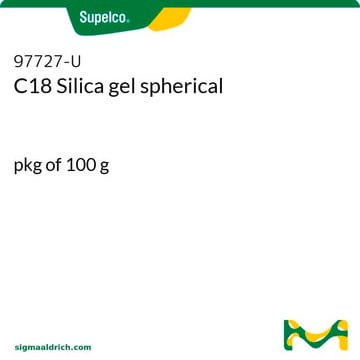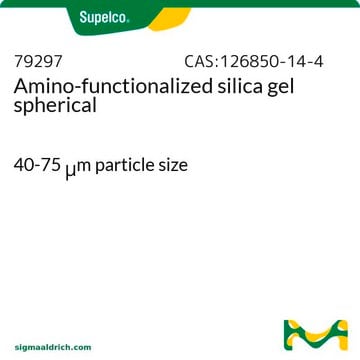53698
Silica gel Inorganic Sorbent
spherical, 200-360 mesh
Synonym(s):
Silica gel
About This Item
Recommended Products
product name
Silica gel spherical, 40-75 μm particle size
grade
high-purity grade
form
powder
manufacturer/tradename
Sigma-Aldrich
technique(s)
LPLC: suitable
surface area
450-550 m2/g
loss
~5% loss on drying
matrix
Silica
matrix active group
silica
particle size
200-400 mesh
40-75 μm
pore size
0.7-0.9 cm3/g pore volume
60 Å pore size
pH
~7 (5% in H2O, suspension)
bp
2230 °C
mp
>1600 °C
separation technique
hydrophilic interaction (HILIC)
SMILES string
O=[Si]=O
InChI
1S/O2Si/c1-3-2
InChI key
VYPSYNLAJGMNEJ-UHFFFAOYSA-N
Looking for similar products? Visit Product Comparison Guide
General description
a. Aquagel - pores are filled with water
b. Xerogel - by the process of evaporation, aqueous phase in the pores are removed
c. Aerogel - solvent removed by supercritical extraction.
Storage Class Code
11 - Combustible Solids
WGK
nwg
Flash Point(F)
Not applicable
Flash Point(C)
Not applicable
Choose from one of the most recent versions:
Already Own This Product?
Find documentation for the products that you have recently purchased in the Document Library.
Customers Also Viewed
Our team of scientists has experience in all areas of research including Life Science, Material Science, Chemical Synthesis, Chromatography, Analytical and many others.
Contact Technical Service



